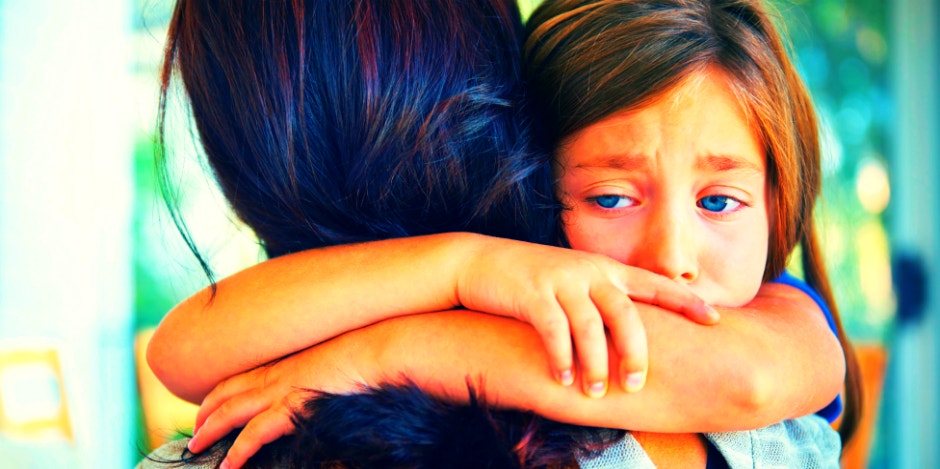9 Brave Ways To Talk To Your Kids About Cruelty And Violence
They need your help understanding the scary things that happen in the world.
 iStock
iStock Violence is everywhere ... or so it seems every time you turn on the radio or scroll through the news.
Whether it's a national conversation about violence against black men in police custody, random and brutal mass school shootings, or violent stories that hit close to home (like the recent horrific "Mansion Murders" where I live in Washington DC) —it's hard to escape stories of senseless violence.
Absorbing such grim realities is difficult enough for us parents; for kids it's even more traumatizing and difficult.
Knowing what to say (or not say) to our children about these incidents is one of the biggest challenges parents face.
We know we must prepare our kids for the realities of the world, yet exposing them to gory details often does more harm than good.
Every parent must navigate finding the right balance for their family. To help, here are nine smart strategies for talking to your kids about violence.
1. Allow yourself to process the incident first. Just like we put our own oxygen mask on first before helping others — talk with your spouse, friends, or family to help you clarify and process your feelings prior to discussing the matter with your kids. This improves your ability to listen to them and dedicate your conversation to their experience when the time comes.
2. Ask what they know. Unfortunately, we can't always control what our kids see and hear from outside sources. TV, radio, the internet, peers at school, or other adults discussing the incident nearby ... kids pick up on what's going on whether you raise the topic or not. So when you set out to talk to your child, start by asking what they already know (or think they know) and how they're feeling about it. This helps you frame your discussion.
3. Listen and convey empathy. When helping kids process a tragedy, let their responses guide your conversation. If they're afraid, validate that their feelings make sense. Then, talk about what you do to stay safe. You can offer age-appropriate specifics, or leave your response vague depending on what your child needs to hear. Assure your children that you'll do everything in your power to ensure their safety. Kids want assurance that we, as parents, have their backs.
4. Answer questions in small doses. A little bit goes a long way. Aim to tell them only as much as they seem curious to know. Kids have a remarkable capacity to let us know us what they can handle, if we listen for those cues. Give answers to their question and then pause to see if your child asks for more information. Don't offer more than they request (especially additional graphic details or frightening insights).
5. Limit media intake and watch with your kids. Following the story and staying abreast of updated news is a natural response to a troubling incident. But repeat exposure to scary news actually increases stress for our kids ... and sometimes even elevates their own violent behavior. Aim to watch media together, readying yourself with every new element to listen to your child's understanding of it and then adjust the conversation appropriately.
6. Acknowledge that suffering happens. Perhaps the hardest part of reconciling a brutal event is imagining the suffering of the victims. It's a place we often get stuck, challenging us to find appropriate words to comfort those around us (and ourselves). This is when it's vital to validate their feelings, and perhaps let them know how you feel and what helps you cope. This positively models to them that not always knowing how to handle something is ok — talking about it helps.
7. Share your beliefs about death. If you believe in heaven or an afterlife, say so. Tell you children what you believe. At the very least, let them know that death brings about a relief from suffering for those who pass on. Teach children that remembering a loved one, or a victim, is how we keep their memory alive.
8. Move forward from loss to legacy. In thinking about the victims, and their untimely and unfair death, consider asking your children what that person's legacy is to those of us still here. This allows your child to think about meaning — nudging them to move towards something active and positive, and away from the gruesome circumstances of the tragedy itself. If this step strikes a chord with your child, consider talking about how your family can honor that legacy.
9. Look for the positive. Tragedy and crises bring people together, and often brings out the best in people. Seeing the best in humanity is a comfort during a time of crisis. A favorite soother of children, PBS's Fred Rogers gives his mother's best advice in a time of crisis, "Look for the helpers. You will always find people who are helping."
Listening to and talking with children about violence in the news isn't easy, I know. But avoiding those hard conversations hinders our children's growth.
It's best to bring hard topics up with children directly and then truly listen to their feelings on that matter. This lets our children know we're here for them, they can handle this, and that you're here to help them.
Scary things in the world happen, but you and your children can handle it when you face it ... together.
Keep up the open dialogue with your kids, and if you feel like you could use a bit more help with parenting, sign up for my parenting blog, or check out my website, where you'll find a wealth of information on parenting, communication, and wellness.

